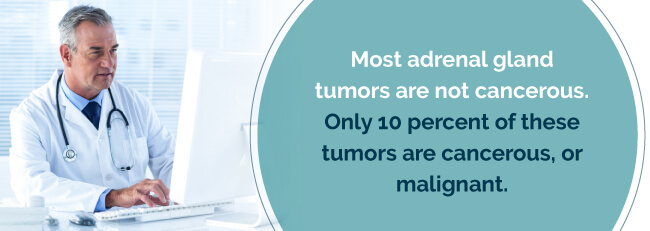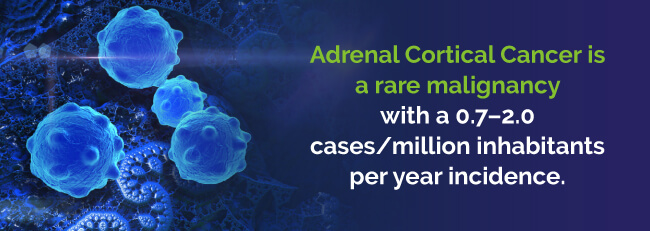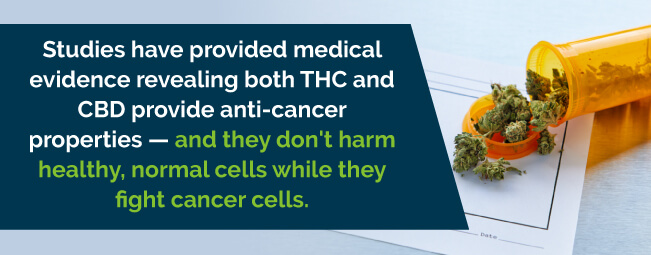Chances are you’ve heard marijuana is helpful in managing the side effects of cancer treatments. You may have already used this herb from the cannabis plant yourself from time to time. There are many names it goes by, including cannabis, pot, weed and grass. Scientists and researchers have been studying medical marijuana, and its ability to treat a whole range of health disorders for quite some time now. And, they’ve now focused some of their attention on medical marijuana for adrenal cortical cancer.
Adrenal cortical cancer is a condition that’s difficult to recognize early. However, there may be some subtle signs. For instance, you may start to sense of fullness in your stomach or pain or feel as if something’s not right with your hormones. Perhaps you gained some weight unexpected.
This aggressive carcinoma begins in your adrenal glands. You have two of these glands sitting on top of each of your kidneys, and there’s a chance one or both of them could develop a tumor.
Adrenal cortical cancer is just one of hundreds of types of cancer. Millions of Americans are afflicted with cancer, the nation’s second leading cause of death.
Adrenal cortical cancer is an aggressive and rare cancer. Only around 300 people in the United States are diagnosed with it each year. Treatment options for adrenal cortical cancer are the same as most other cancers — surgery, chemotherapy and radiation therapy, which are often harsh and cause severe side effects and pain.
With adrenal cancer, by the time any symptoms show themselves, your tumor is usually already large. However, there are treatment options available ranging from medications to surgery to medical marijuana poised to alleviate your symptoms or even eliminate the tumor. For some individuals, surgery is just what they need to remove the tumor and cure the disease. For others, cancer returns.
There are two types of this cancer:
1. Functioning tumors increase adrenal hormone production. With a functioning tumor, large amounts of testosterone, cortisol and aldosterone (regulates blood pressure) reside in the body.
2. Nonfunctioning tumors don’t increase hormonal production in your adrenal glands. However, they could present symptoms due to their increased size and pressure on other organs.
Most adrenal gland tumors are not cancerous. Only 10 percent of these tumors are cancerous, or malignant.

Cancerous or malignant tumors start in your adrenal cortex, which is the outer layer of your adrenal gland. Symptoms tend to present once the tumors have become cancerous.
Symptoms of adrenal cortical cancer include:
After receiving a diagnosis of adrenal cortical cancer, you may also have social and emotional effects as well. Often, individuals find it difficult to express how they feel to their family and friends. Cancer may bring on a range of emotions, including, but not limited to, the following:
It’s normal to feel these emotions. In fact, psychological care is an essential part of your cancer care. When you address your mental and emotional well-being, it will help you feel more in control and relaxed. You’ll be able to cope better, overcome depression and anxiety and have a better quality of life. You should share your feelings with your family and with a professional on your healthcare team.

Since ancient times, there have been multiple references to adrenal glands and their existence. The Bible revealed the first account of the adrenal glands in the western world was found. Bartholomeus Eustachius (1520-1574) received credit for the discovery and first description of the adrenal gland in most of the literature.
Historically, only around 30 percent of adrenocortical carcinoma (ACC) malignancies are limited at the time of diagnosis to the adrenal gland. But, more patients with ACCs have recently received a diagnosis at earlier stages, probably due to the use of higher quality imaging methods. Early identification and referral, along with multi-center studies and their optimization of remedial protocols, might enhance prognostic aspects.
According to the NCBI:

Your physician will discuss your ACC treatment options after you receive your diagnosis. Take time to consider every possibility and give each one some careful thought.
Before you decide on a treatment plan, you need to consider several factors, including the stage of your cancer and your overall physical health. You might want to get a second opinion to provide you with additional information to increase your confidence about the treatment plan you or your doctor choose. Getting a second opinion could be beneficial since adrenal cortical cancer is rare and much of the experience in treating this cancer comes from larger cancer centers.
Adrenal cancer research is currently underway. This research comprises medical laboratory tests to distinguish carcinomas from adenomas more accurately, imaging tests to diagnose this cancer and newer treatments. Research regarding the disease is progressing slowly, perhaps because it is so rare.
Primary types of adrenal cancer treatments include:
Chemo uses medications to kill cancerous cells in your body. You take these drugs either by mouth or through an IV. Side effects of chemotherapy may include:
Chemo works on your growing and dividing active cells. Cancerous cells are active. But, some of your healthy cells are active as well. These are cells in your mouth, blood, hair follicles and digestive system. Because chemo damages healthy cells, it causes these above side effects.
Your surgeon removes your adrenal gland and if needed, the surrounding tissue during surgery. Side effects of surgery may include:
Before agreeing to surgery, your doctor should give you information about the benefits and risks of surgery. They’ll also go over these and other side effects with you.
Like, chemo, radiation therapy also kills cancer cells. There are a couple of types of radiation therapy.
1. Internal therapy: Your doctor directs radioactive substances inside your body, to your tumor. They may use needles, catheters or wires to administer this therapy.
2. External radiation therapy: Doctor applies this therapy from outside your body.
Side effects of radiation therapy may include:
Since radiation therapy is a local therapy, it only affects the part of your body where you have the tumor. Any side effects you experience will likely go away after treatment. However, you may continue to experience some side effects. Some may return while others develop later on. You may develop a second cancer as one of the following effects, but this is unlikely.
Biologic therapy uses your own body and immune system to destroy your cancer. Side effects of biologic therapy may include:
Any side effects you experience will vary with the type of biologic therapy you receive.
A new form of cancer treatment, targeted therapy uses medications and other substances to attack the mechanisms that make cancer cells differ from your healthy cells. Different types of targeted therapy work differently. However, all of these treatments change how cancer cells grow, divide, repair themselves and interact with other cells.
One particular targeted therapy medication showing promise as an adrenal cancer treatment is cixutumumab. This medication blocks insulin-like growth factor 2 (IGF2), which is said to increase adrenal cancer growth. When doctors combined cixutumumab with the medication temsirolimus in many patients, their tumor growth halted, according to a study reported by the American Cancer Society.

Other targeted medications for adrenal cancer researchers studied didn’t seem to be helpful. Liver problems (elevated liver enzymes and hepatitis) and diarrhea are the two most common side effects patients experience with targeted therapies. Other side effects seen with targeted therapies include:
Your doctor may combine some of these treatments depending on your stage and type of cancer.
The therapeutic effects of medical weed come from its cannabidiol (CBD) concentration, specific terpene and flavonoid content. Tetrahydrocannabinol (THC) is another part of the plant offering psychotropic effects on your brain.
Individuals who use weed for recreational purposes are usually doing so for its THC. But, there are strains of marijuana with lower THC levels and higher CBD content to bring out its medicinal properties.
Both older and more recent studies have provided medical evidence revealing both THC and CBD provide anti-cancer properties — and they don’t harm healthy, normal cells while they fight cancer cells. Other traditional treatments, not only harm cancer cells but also healthy cells.

There are over 85 cannabinoid types in cannabis providing active chemicals for causing the drug-like effect in your body. There are now synthesized pill forms of these cannabinoids to treat cancer symptoms and the unwanted side effects of chemotherapy. Nabilone/Cesamet and Dronabinol are two THC synthetic pills approved by the FDA and doctors prescribe them to treat nausea and vomiting associated with chemotherapy.
Cannabinoids like CBD, THC, CBC, CBG, CBDa and THCa all benefit people who live with cancer. CBD alone is known to lower inflammation, relieve pain and reduce anxiety without creating the “high” feeling THC does.
Cannabis may provide you with relief and increase your quality of life if you’re receiving chemotherapy or radiation therapy.
Doctors treat ACC with methods similar to other cancer types — including chemotherapy and radiation. These treatments can cause many severe side effects.
Common side effects of the treatments for adrenal cortical cancer medical marijuana can treat include:
Marijuana for adrenal cortical cancer can tackle these unpleasant side effects and may even help kill your cancer cells altogether.
Marijuana for adrenal cortical cancer can tackle these unpleasant side effects and may even help kill your cancer cells altogether.
Countless medical studies show medical marijuana is an effective treatment for symptoms of cancer as well as the side effects of harsh cancer treatments. Researchers have also found cannabis lacks the significant or toxic side effects seen in traditional medicines. THC is a natural antiemetic shown to help decrease the pain associated with many types of cancer and chemotherapy agents. THC can also help battle chemotherapy-induced nausea and vomiting (CINV).
Each medical marijuana strain offers a distinct effect profile. When battling cancer, you’re going to experience symptoms of the cancer itself as well as side effects of treatments. Below are some best strains for fighting these symptoms and side effects:
* Blackberry Kush
* Harlequin
* ACDC
* Blueberry Diesel
* Super Lemon Haze
* Bubba Kush
* Skywalker
* Grandaddy Purple
* Super Silver Haze
* Chernobyl
* Pennywise
* Strawberry Cough
* Pineapple Express
* Chocolope
The following are popular methods for administering your marijuana and adrenal cortical cancer therapy.
You smoke marijuana through a pipe, joint or water bong. With this method, you may lose some of the drug as it burns. Using a water pipe helps to prevent some of the irritation that smoking causes to your airway.
When you heat medical pot to a certain temperature, it releases the medication into vapors that you can breathe in.
With this form, you place marijuana under your tongue to get instant relief. Those who don’t like to smoke the herb appreciate having this option.
You can also purchase brownies, cookies, cakes and other foods that have medical marijuana baked into them. Although there could be absorption complications due to the affinity cannabinoids have for fat, edibles are still a good option for people who prefer not to smoke.
Medical weed comes in various topical forms including ointments, lotions and creams that help with inflammation of the skin, muscle pain and arthritis.
Medical cannabis for adrenal cortical cancer can help with a whole range of conditions. Even though administration methods will vary, make sure the medical-grade marijuana you get lacks any synthetic chemicals and pesticides.
If you are looking to find relief from symptoms of adrenal cortical cancer and side effects of cancer treatments with medical cannabis, MarijuanaDoctors.com can help. Search for a doctor and book an appointment with a local, qualified physician through our website today. Let us help improve your quality of life.
Find A Doctor Find A Dispensary